

Let Me Down Easy |
||
|
Portraits based on verbatim excerpts from interviews conducted by |
||
|
|
||
| Connecticut College Department of Theater |
Follow Us:
Let Me Down Easy consists of a series of monologues constructed from interview transcripts. The shared stories reflect the experiences of the (very real) people portrayed.
There will be references to:
death and loss
sexual assault of a minor
cancer treatment.
Please take care of yourselves and one another.
Running Order
JAMES H. CONE: ”Let Me Down Easy”
Author and Professor, Union Theological Seminary, NYC
ELIZABETH STREB: ”Fire Dance”
Choreographer, STREB Extreme Action Company
LAUREN HUTTON: ”Mojo”
Supermodel
RUTH KATZ: ”That Bedrock of Care”
Patient, Yale New Haven Hospital
KIERSTA KURTZ-BURKE: ”Heavy Sense of Resignation”
Physician, Charity Hospital, New Orleans
SUSAN YOUENS: ”Passing Bells”
Musicologist, University of Notre Dame
ANN RICHARDS: ”Chi”
Former Governor, Texas
LORRAINE COLEMAN: ”Gloves”
Retired Teacher, Anna Deavere Smith’s Aunt
JOEL SIEGEL: “3,000 Years of Being Kicked Around Europe”
Movie Critic ABC News
A Note from the Director
We’ve been through a lot. Despite the stress and the uncertainty, we have found compassion for ourselves and for one another through the stories that we share.
This is what we do in the theater. We experience perspectives, emotions, and truths that may depart widely from what we’ve known. And we’re better for it. We’re more kind because of it.
The following performances are taking place in real time. Each performer is in their own room, with the door closed, in the Connecticut College Theater Department’s temporary home at 33 Gallows Lane.
It’s not what we originally intended for this production. Yet it’s become more meaningful than any of us expected. The live performance you witness today represents a common experience - one that included necessary restrictions on gatherings, rehearsing from quarantine, and a heightened desire to keep ourselves and vulnerable loved ones in our community as safe as possible during this phase of the COVID-19 pandemic.
As they remove their masks to perform, the actors are in isolation, but they are very much present with one another and with all of you.
Thank you for joining us.
Cast
Creative Team
Ginny Anderson
Deb O.
Sabrina Notarfrancisco
Carly Centanni
Alison Andersen
Rodney Dumond
Bruce Valenti
Julie Foh
Nadia Hopkins
Kayla O'Malley
Victoria McCallion
Erin Flanagan
Jordan Galloway
About the Playwright
Who is Anna Deavere Smith?
Anna Deavere Smith is a MacArthur Award winning playwright and actress. She is best known for creating a new style of theatre, which combines social commentary, theatrical performance, and journalism. Rooted in research, each of Smith’s works centers around interviews that she conducted with real individuals. It is Smith’s belief that through a diverse and wide breadth of interviews comes a more powerful, genuine, and honest form of theatre. The same can be said of her style of acting, which pays homage to real people without mimicking or parodying.
Meet the Company
Ian Hopkins
Mia Rubino
Vera Alexandrov
Ryan DeAngelis
Leanne Duckett
Katie Caviness
Gabi Craig
Leila Hernandez-Webster
Caileen Hayes
Ginny Anderson
Deb O.
Sabrina Notarfrancisco
Carly Centanni
Alison Andersen
Rodney Dumond
Bruce Valenti
Julie Foh
Nadia Hopkins
Kayla O'Malley
Victoria McCallion
Erin Flanagan
Jordan Galloway
Photos
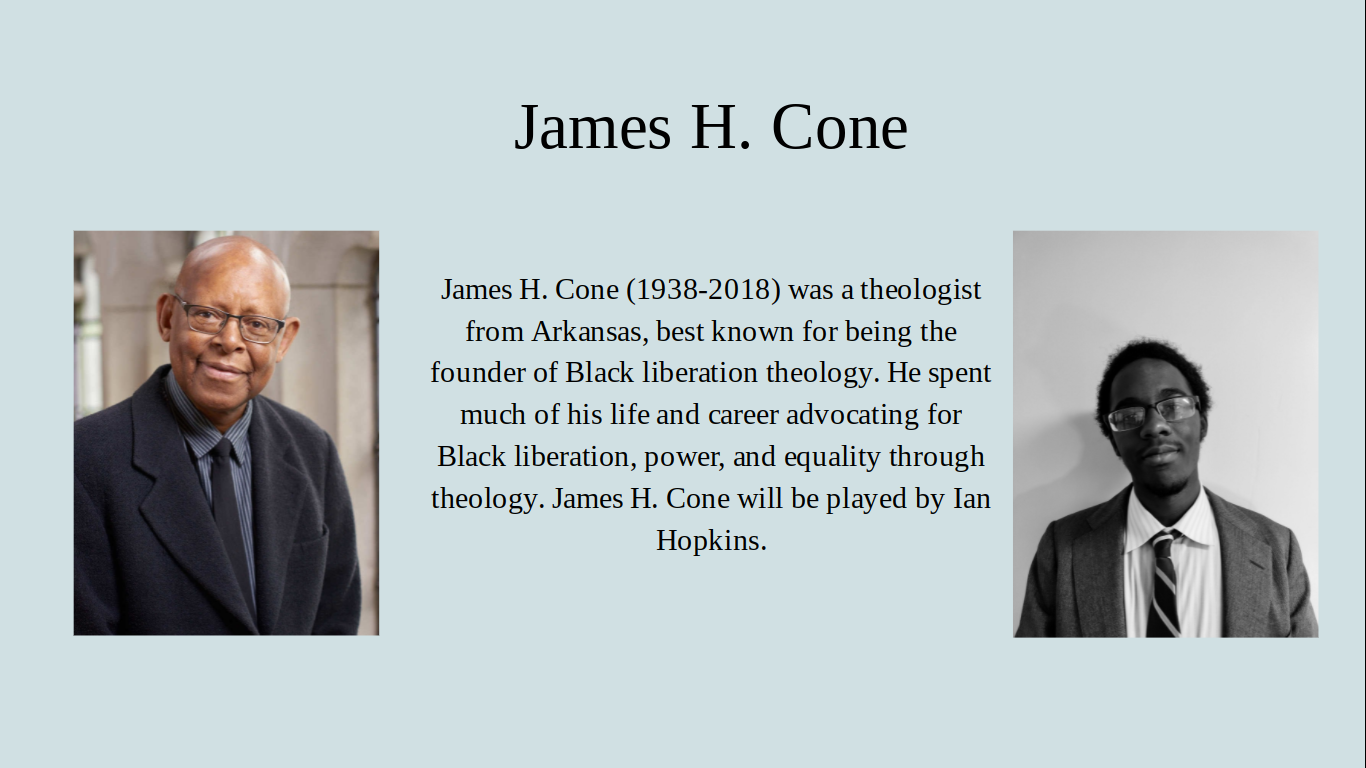
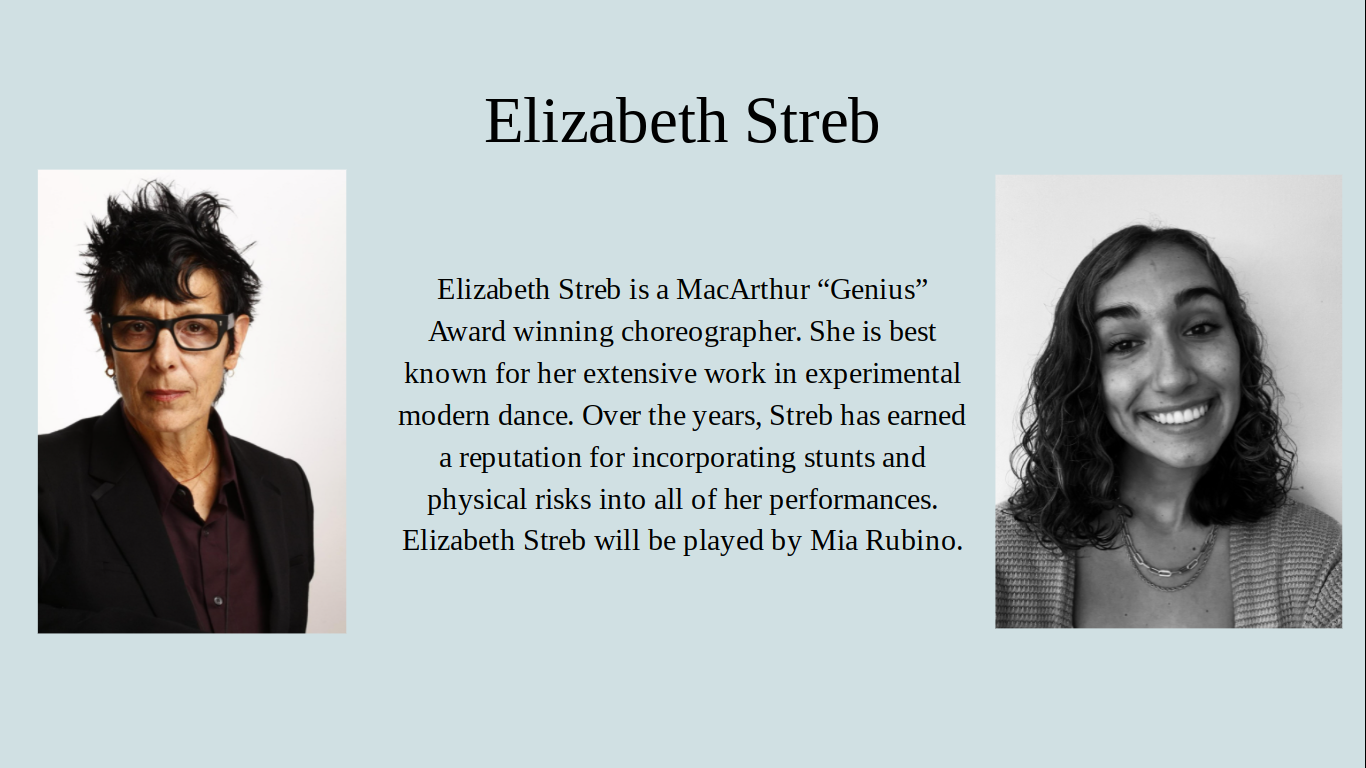
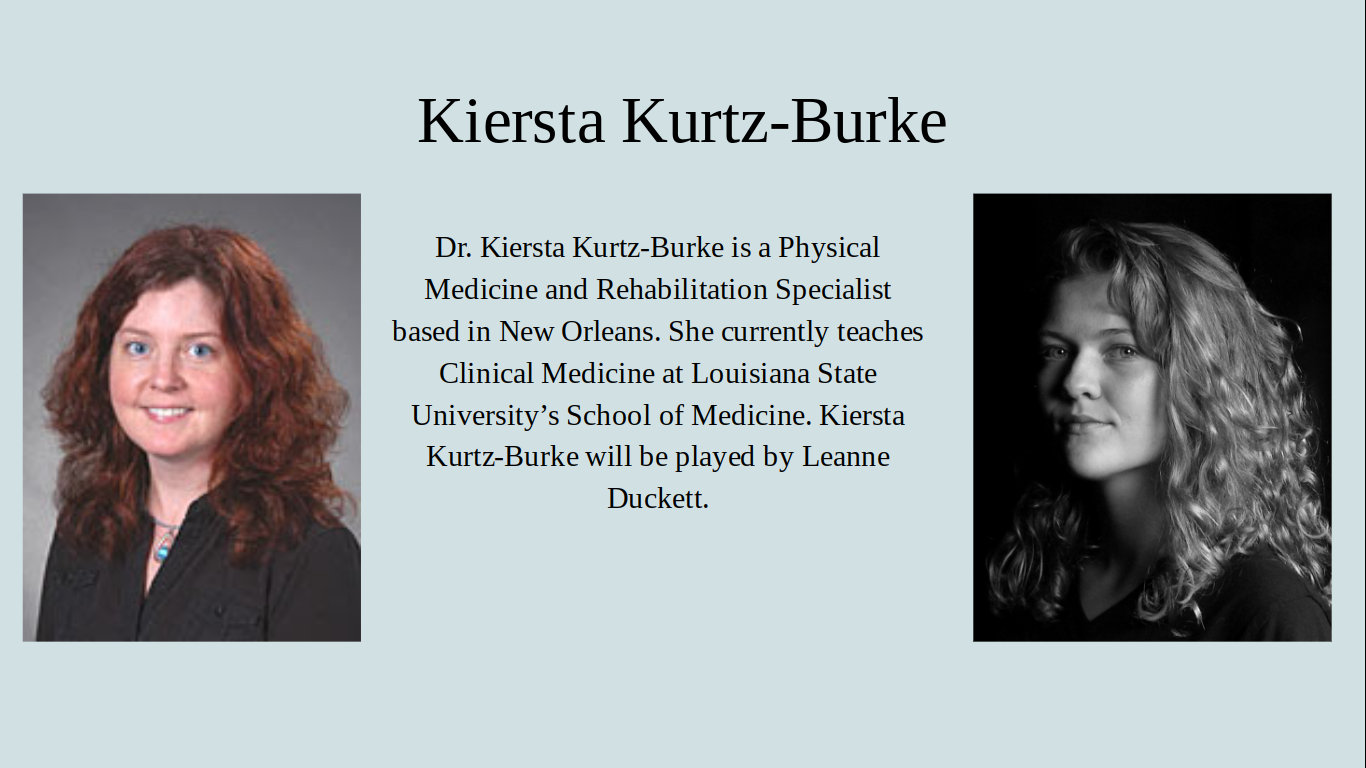
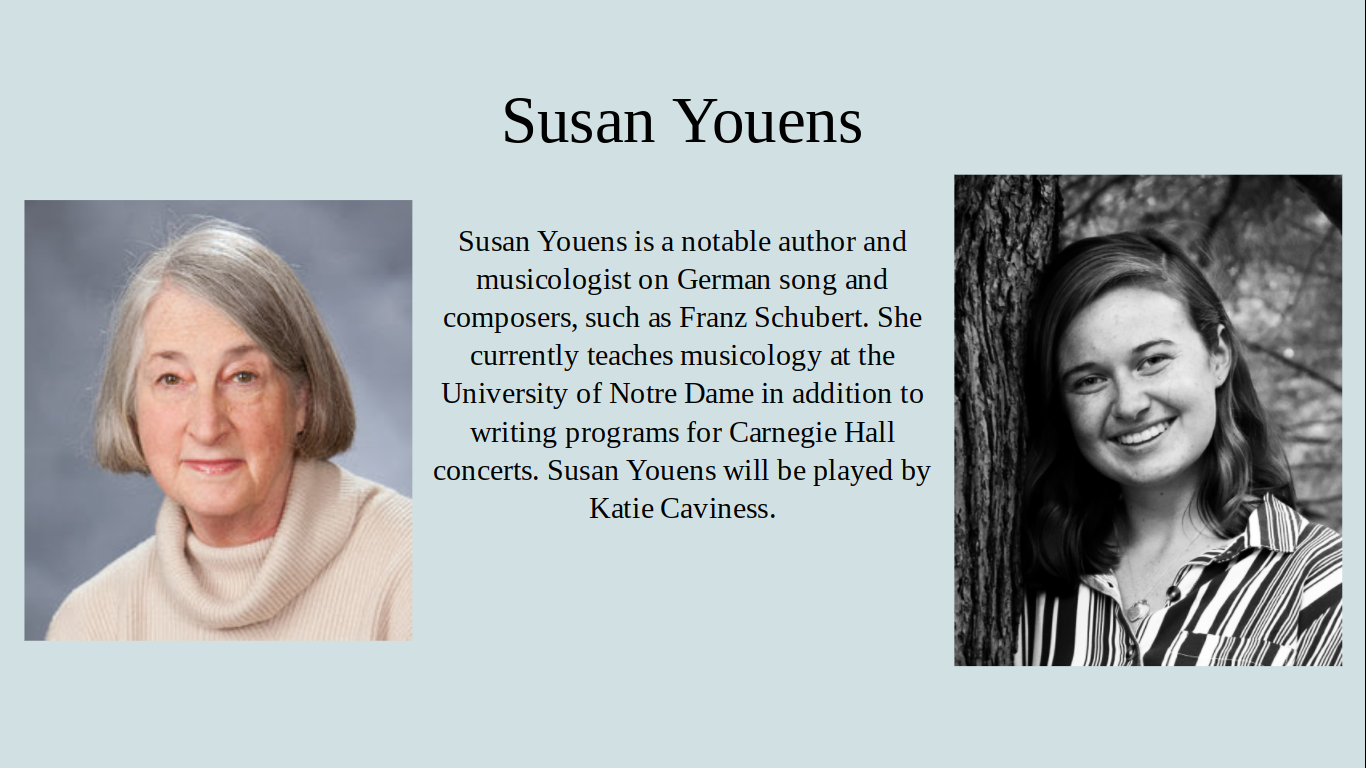
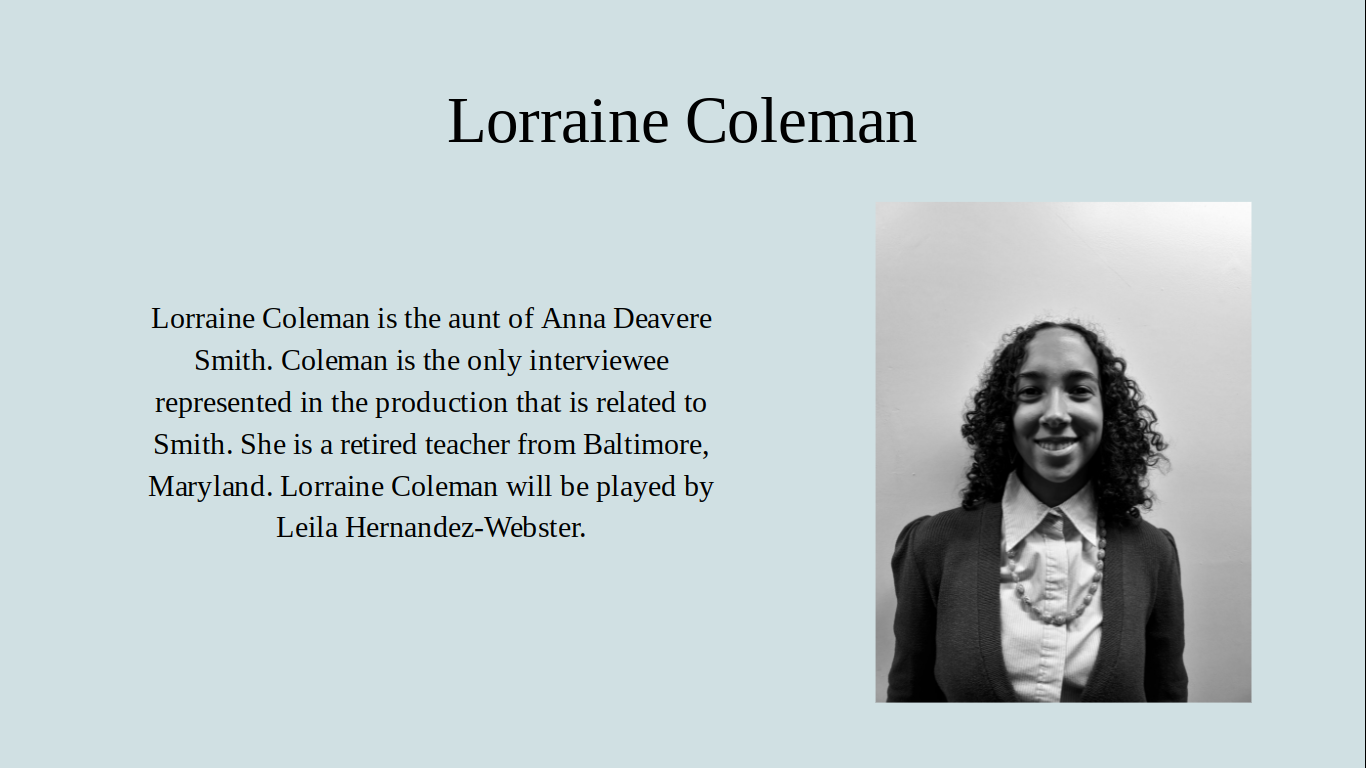
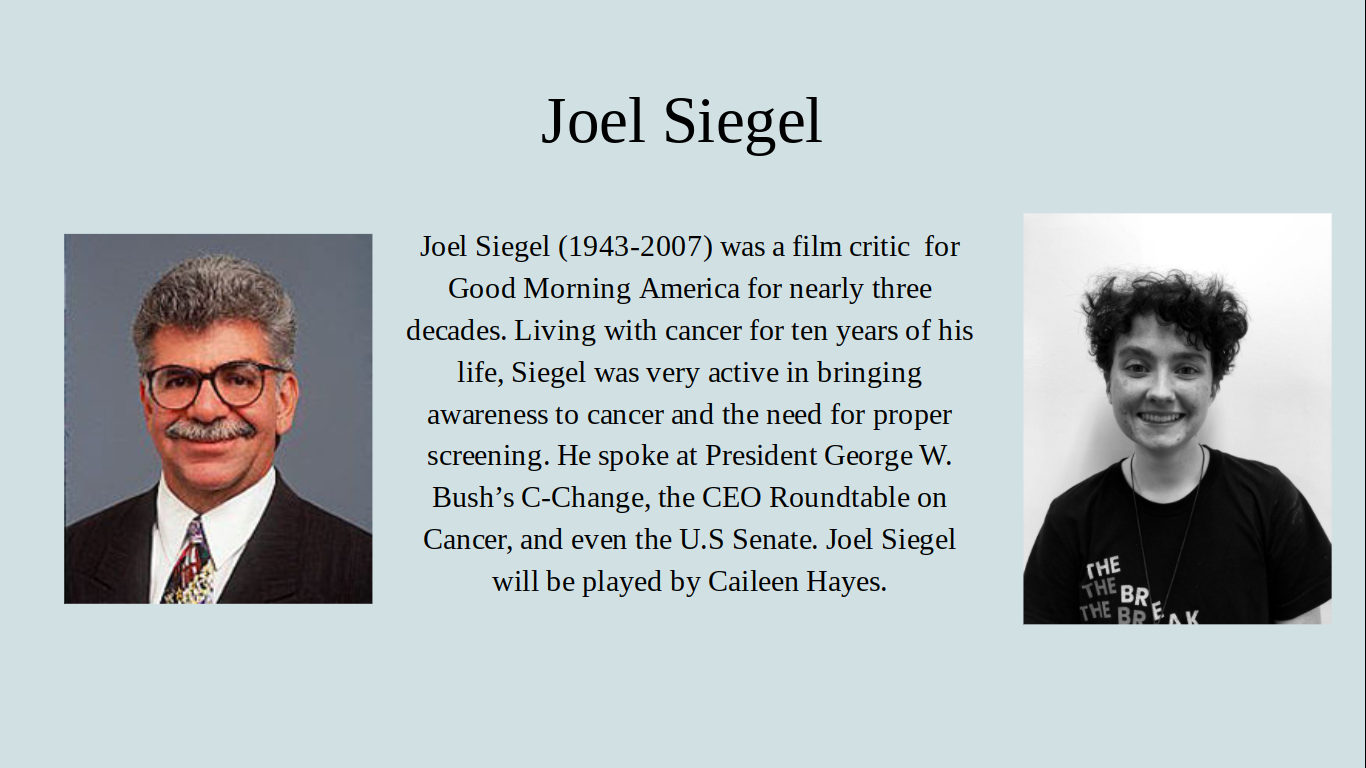

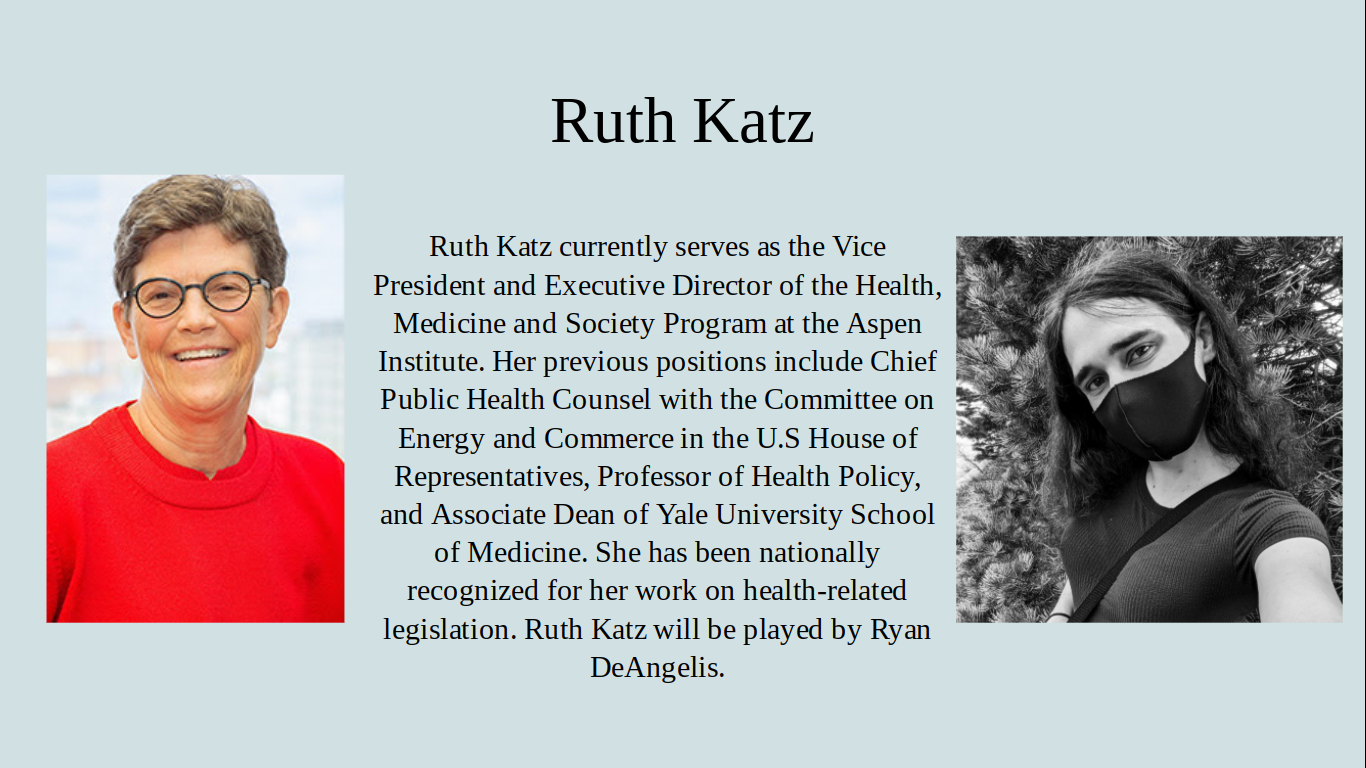
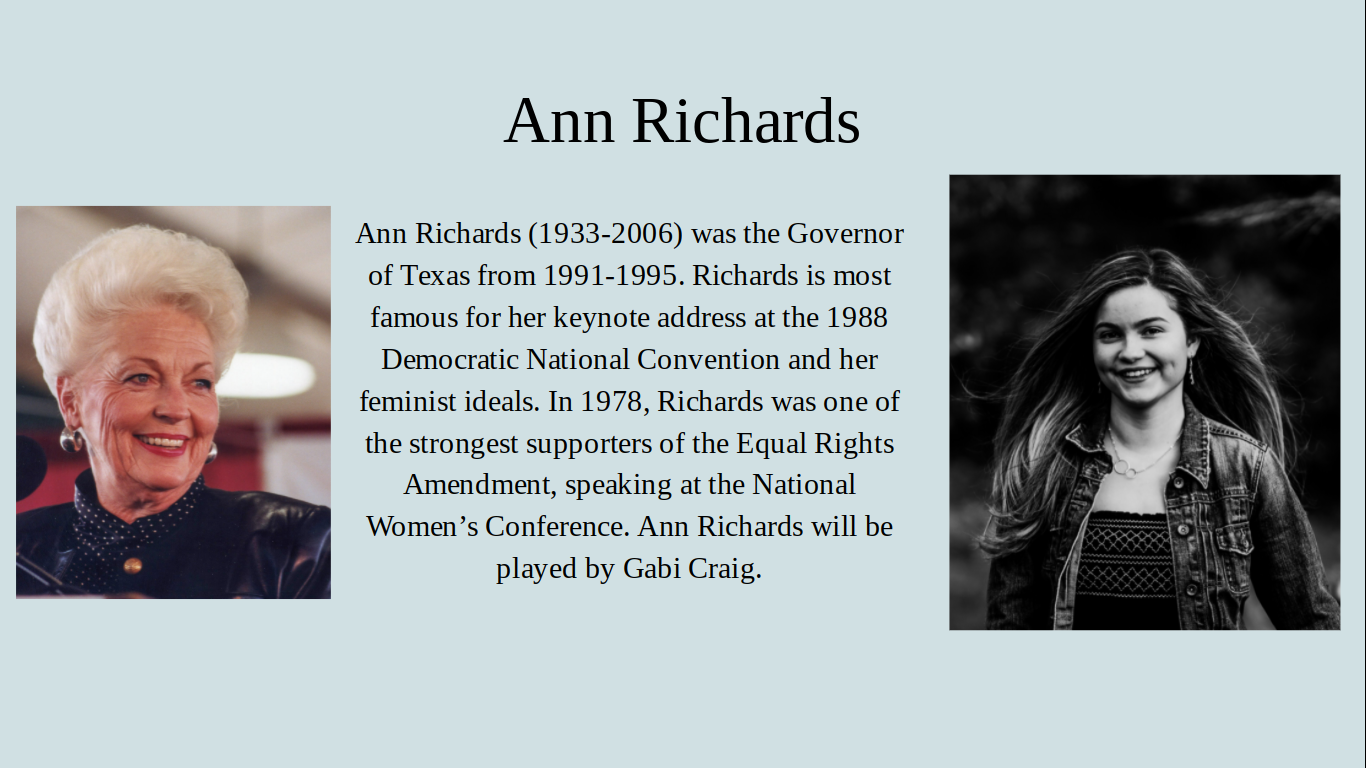
Dramaturgy Notes
Throughout Let Me Down Easy, the theme of power and vulnerability within the human spirit is heavily present. As playwright Anna Deavere Smith in an interview with PBS, has argued, during a shift of one’s health or that of a loved one, the human spirit finds itself in both the most vulnerable and powerful position possible as it faces the unique challenges presented with illness, injury, and death. Within the play, the people portrayed expound upon their own experiences of coping with medical crises, whether they be through sadness, humor, meditation, or acceptance. Though there is a common societal belief that a decline in health equates to a decrease in mental, physical, and emotional strength, many of the interviewees express finding newfound power and determination as a result of shifts in health. Smith’s intent is to address this notion by allowing the complexity of real-life experiences to speak for themselves in demonstrating the difficult balance people face between their strength and vulnerability in times of health crises.
Though the individuals represented in this production recount their own stories alone and do not interact with one another, they are united by the commonality of humanity. Whether young or old, rich or poor, famous or ordinary, witnessing a health crisis or living one, each interviewed person and their story is rooted in the fact that they are human. Beyond fame, politics, careers, or personal triumphs, each of these nine individuals are humans with real human health crises and concerns. Through Smith’s presentation of various stories comes the reality that in life, health is an equalizer, regardless of who you are.
A guiding question of Let Me Down Easy is “do we have the most caring society that we could when it comes to health?” One of the most significant elements of works by Anna Deavere Smith is placing emphasis on the inequalities within society, and this play shines a light on that. While health may be an equalizer between all humans, healthcare can cast a great divide between individuals, primarily due to their race, class, and even notoriety. Highlighted in a number of the play’s monologues, the concept of some receiving more or less medical attention based on the criteria of ability to pay, race, and social status is a harsh and concerning reality that many face. In demonstrating the core issues within the healthcare industry, Let Me Down Easy presents the opportunity for change, starting with the acknowledgement of the inequalities interwoven within illness treatments, hospital protocol, and access to health services. It is from recognizing these concerns and problems laid out in Smith’s play that a kinder, more inclusive social approach to healthcare can begin.
Despite originally being performed in 2009, Let Me Down Easy’s message about health, the human spirit, and the ways that society can be more equitable when addressing the health of all, is just as timely when considering the world’s current medical climate. Much like the various interviewees of Smith’s play, the world has faced power and vulnerability in the ongoing Covid-19 pandemic; it has suffered moments of difficulty and tragedy, while also seeing individuals find strength through the immense challenges of shifting life to a new version of society. While it was Covid that pulled individuals more apart than ever before, it is the idea of health that has united billions of people across continents. Regardless of background, class, or race, everyone has faced moments of vulnerability; everyone has faced moments of strength. Everyone has experienced either human kindness or the lack thereof, which will hopefully prompt not simply the healthcare industry to change for the better, but for all of society to do the same. In Anna Deavere Smith’s works art has always imitated life, but perhaps, in the world post-Covid, life might imitate art and work towards that ultimate, caring, health-conscious society that Let Me Down Easy hopes to see one day.
Department of Theater
DEPARTMENT OF THEATER
Alison Andersen, Assistant Professor
Virginia (Ginny) Anderson, Associate Professor
David Jaffe, Professor
Rachel Jett, Adjunct Faculty
Steve Luber, Adjunct Faculty
Sabrina Notarfrancisco, Associate Professor
Kenneth Prestininzi, Associate Professor, Chair
Dotty Jo Scott, Academic Department Assistant
DEPARTMENT OF ARTS PROGRAMMING
Rob Richter, Director
Joe Matovic, Assistant to Director & Box Office










